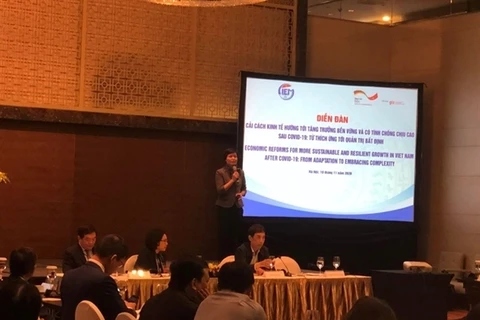 A workshop on commercial transactions on e-commerce sites and key legal issues is held in HCM City on November 10. (Photo: VNA)
A workshop on commercial transactions on e-commerce sites and key legal issues is held in HCM City on November 10. (Photo: VNA)Ho Chi Minh City (VNA) - Online shopping traffic in Vietnam so far this year rocketed over 150 percent against a year earlier, with daily visits to e-commerce sites growing to 3.5 million, said Nguyen Ngoc Dung, Deputy Chairman of the Vietnam e-Commerce Association (VECOM), during a workshop on November 10.
E-commerce sites are booming, creating an engine for enterprises to thrive while stimulating consumer demand and boosting transaction numbers, Dung told the workshop on commercial transactions on e-commerce sites and key legal issues, held in HCM City by the Vietnam International Arbitration Centre (VIAC) in partnership with the Investment and Trade Promotion Centre of HCM City (ITPC) and VECOM.
Vietnam’s e-Commerce White Book 2020 revealed that the country’s e-commerce retail sales surged 25 percent to 10.08 billion USD last year, making it the third-fastest growing e-commerce market in Southeast Asia.
In 2019, e-commerce accounted for 4.9 percent of the total retail sales of goods and services, and about 42 percent of the Vietnamese population purchased goods online, according to the report.
Thanks to e-commerce platforms, enterprises are more flexible in business operations and able to serve an increasing number of customers, ITPC Deputy Director Nguyen Tuan said. More importantly, they are one step closer to digital technologies.
Instead of doing business in the conventional manner, Vietnamese companies are gradually shifting towards e-commerce, he continued, focusing more on developing their websites and running business systems via online tools, such as email or social networks, to save time and improve efficiency.
Tuan described this as a good sign, especially at a time when many businesses are struggling because of COVID-19.
To ensure that e-commerce transactions are safe and secure and to guarantee the rights of all stakeholders, it is important to develop a legal framework relevant to Vietnam’s circumstances.
A survey has revealed that most of the e-commerce sites only require that vendors provide basic information, which has resulted in some failing to meet their obligations. Violations are now more common, and many sites have yet to adopt an effective mechanism to monitor vendors’ adherence to regulations.
Within the framework of the workshop, agreements were signed between VECOM and ITPC and VECOM and VIAC, to pave the way for joint efforts on improving the competitiveness of Vietnamese enterprises and helping them reduce their legal risks when doing business on e-commerce platforms./.
VNA
























